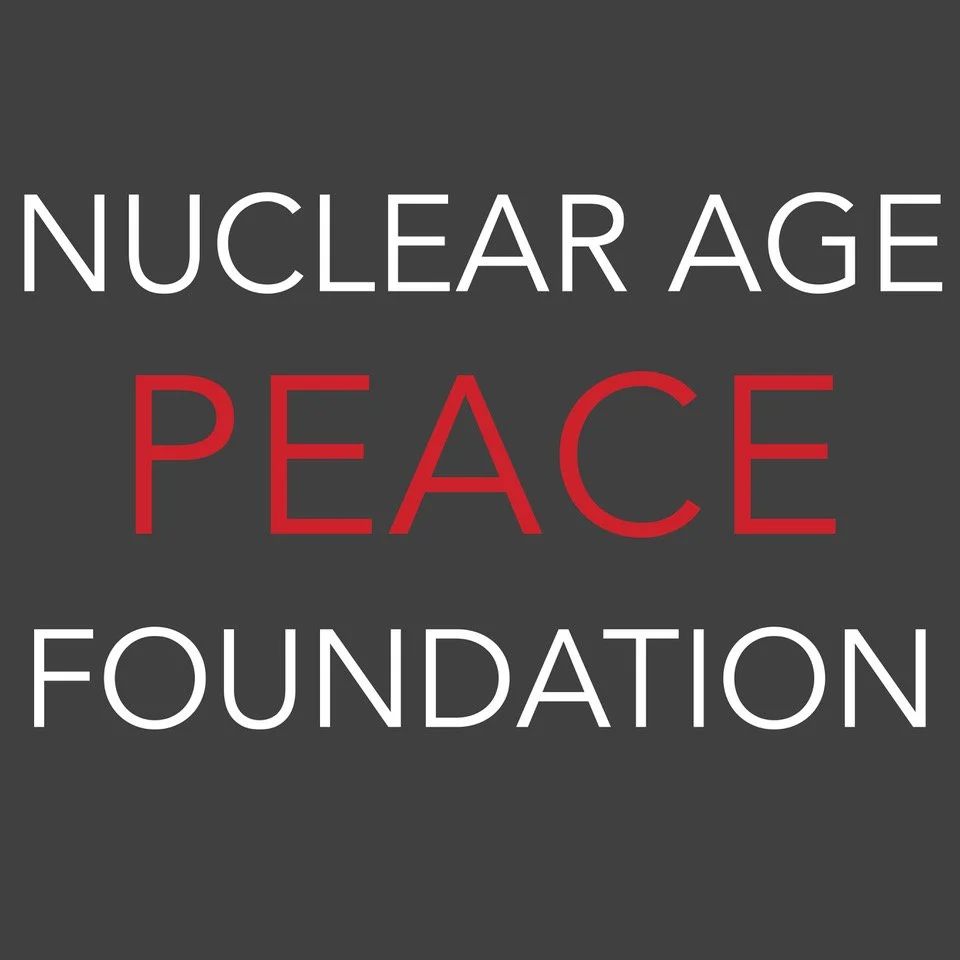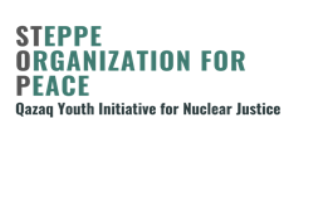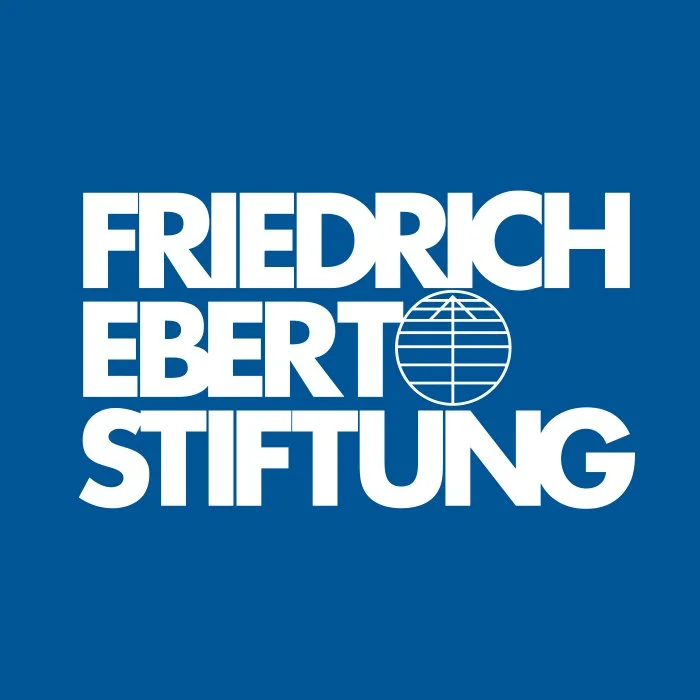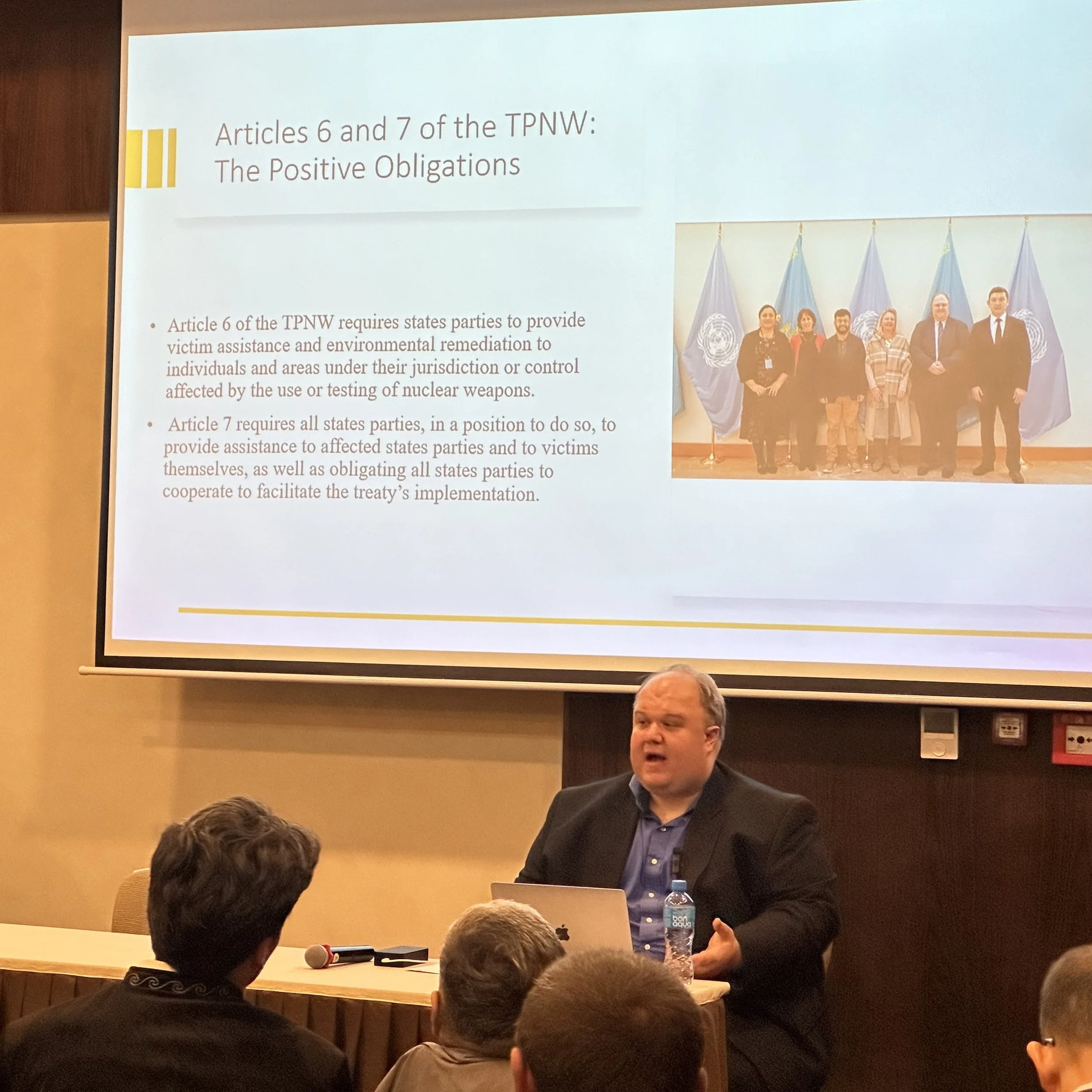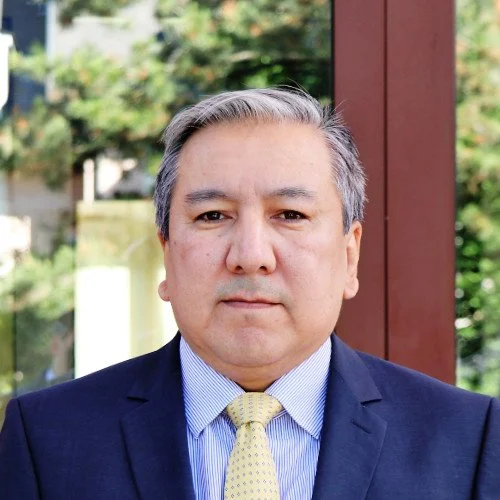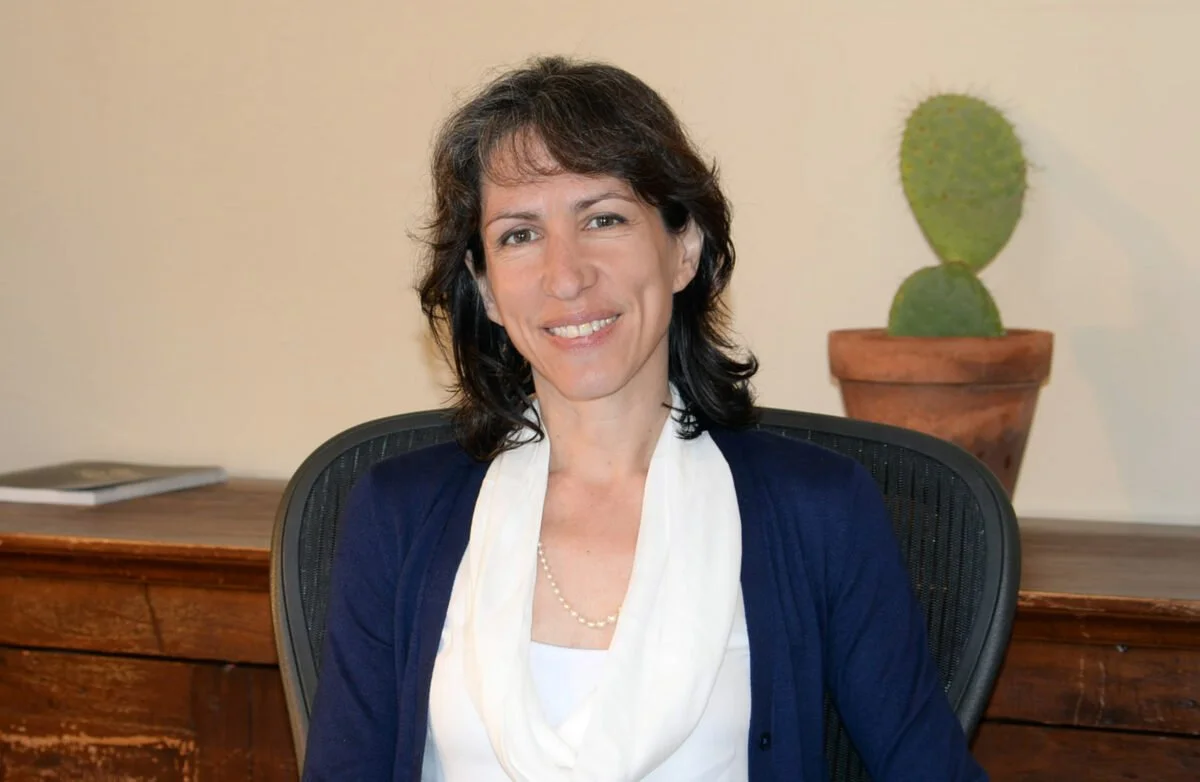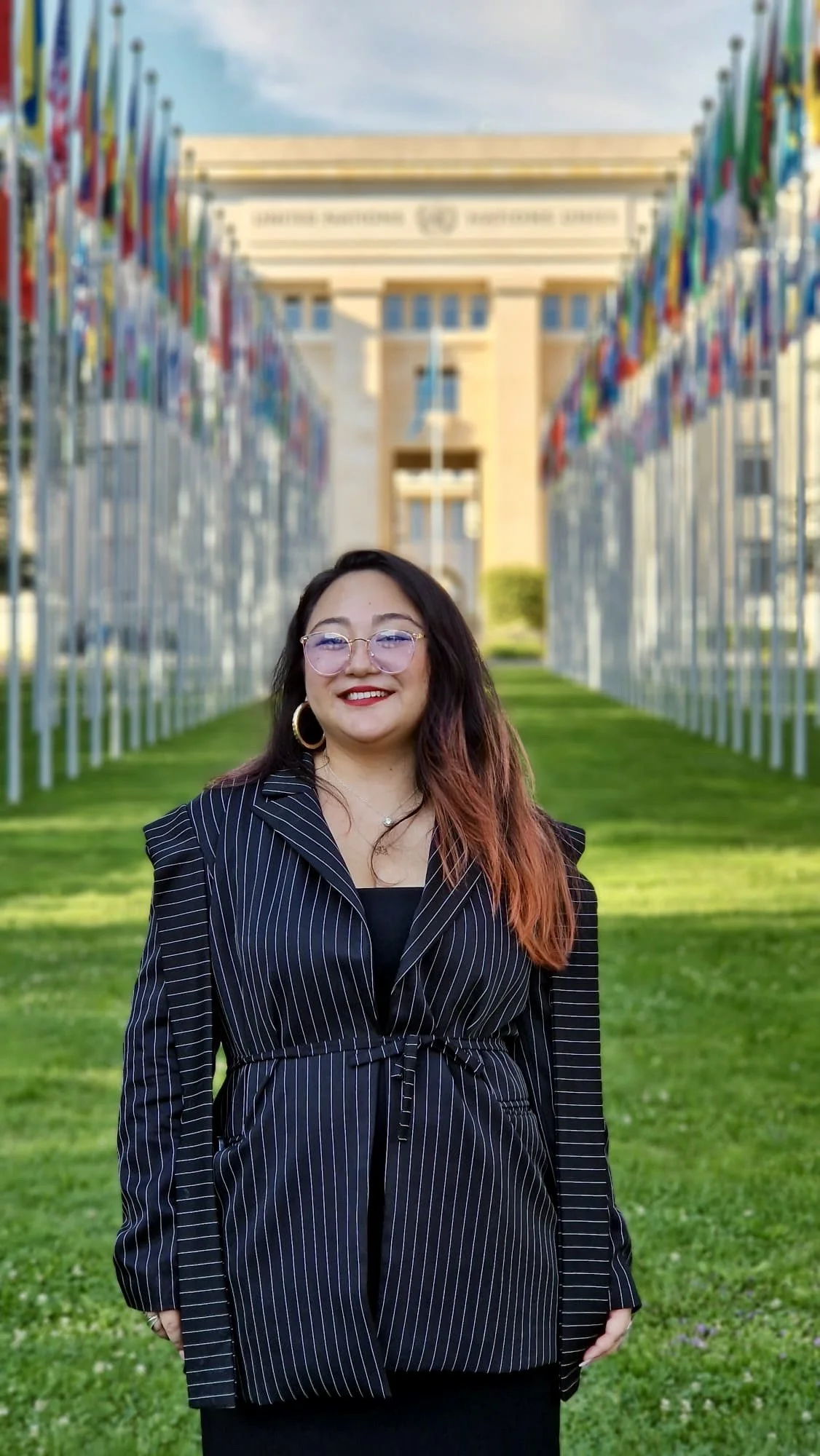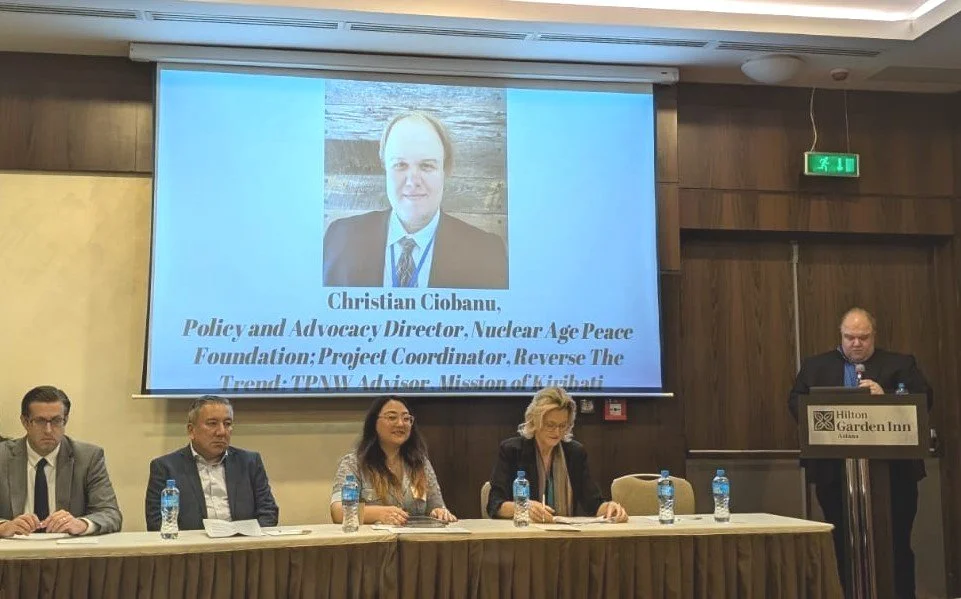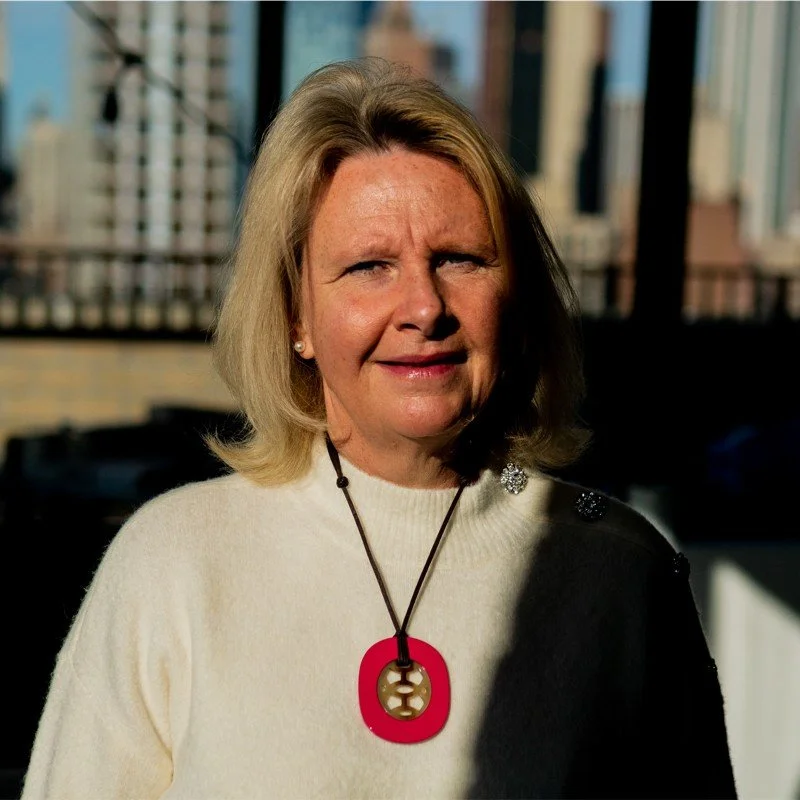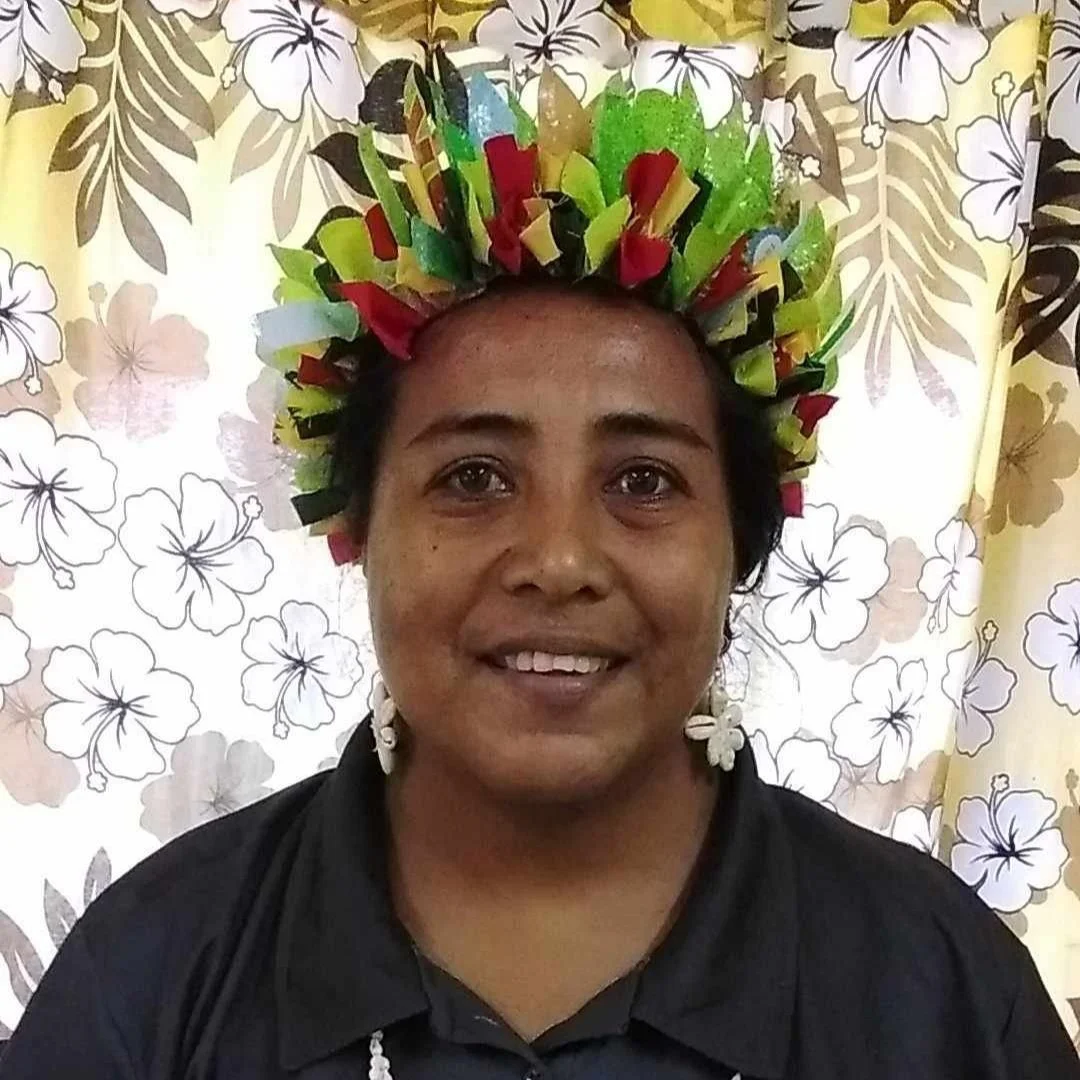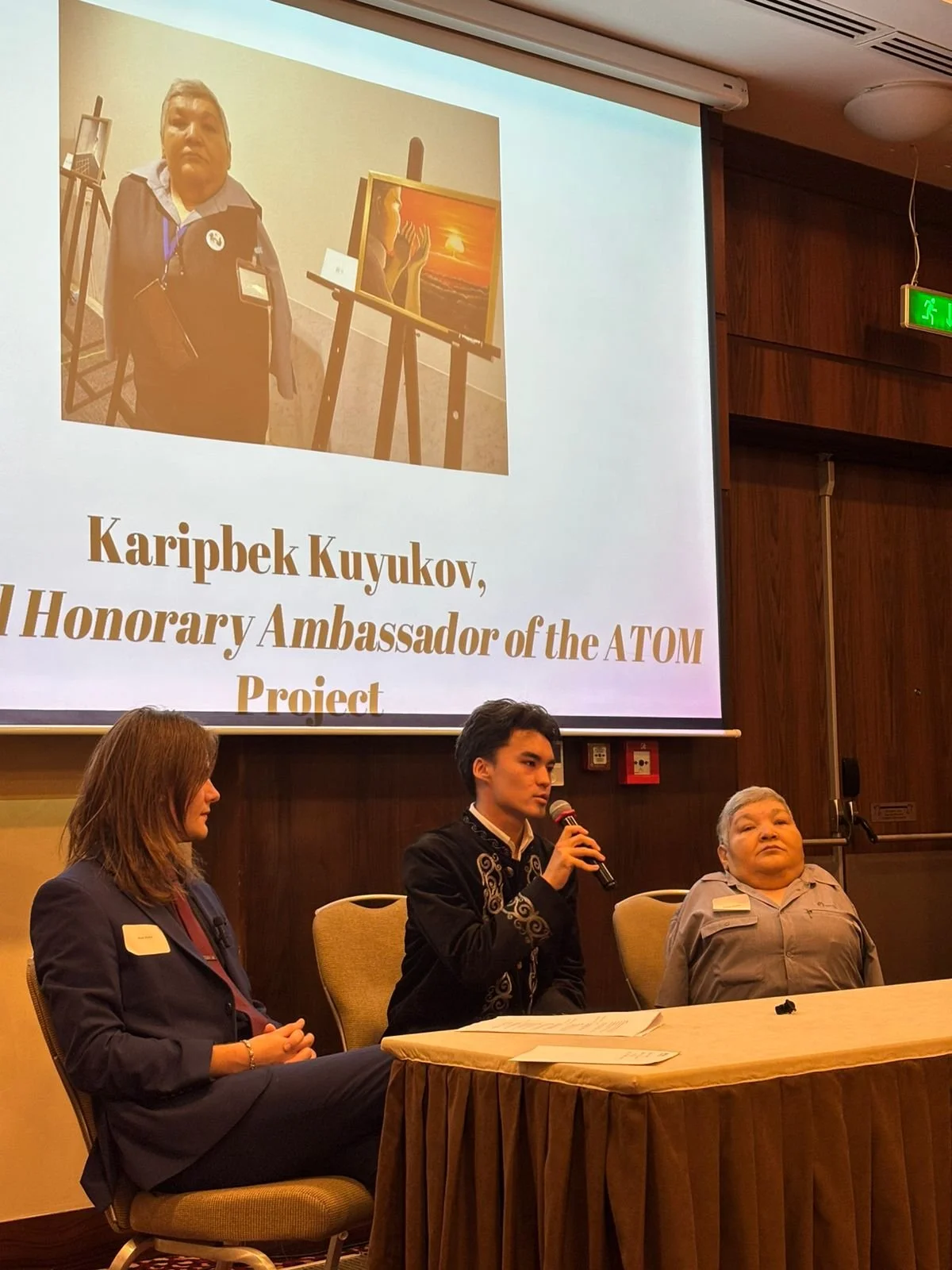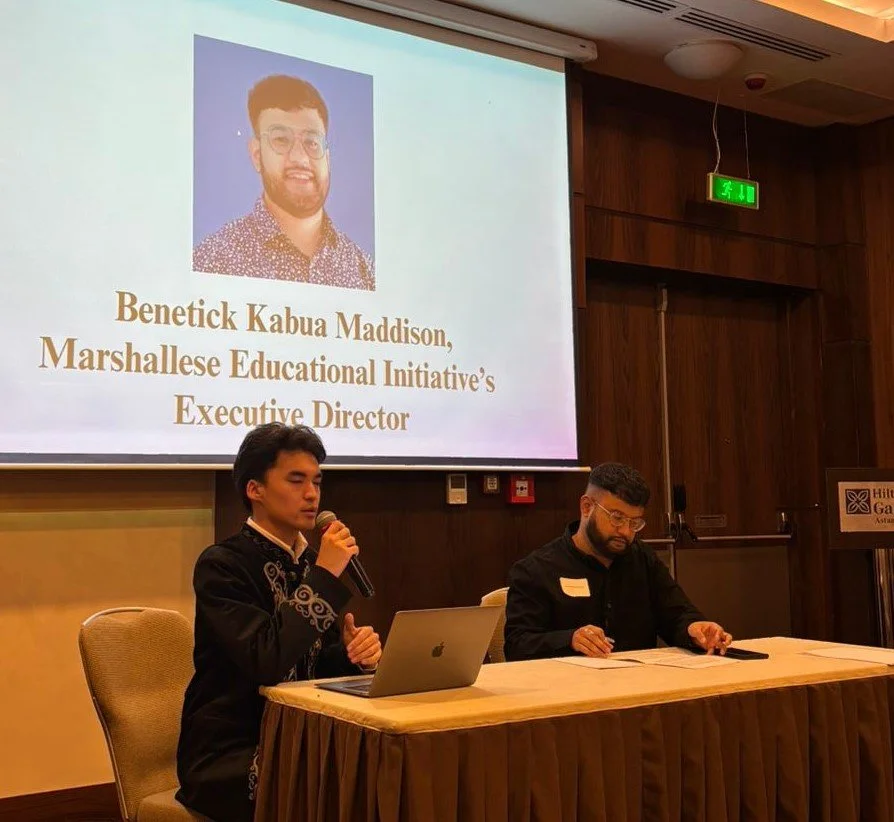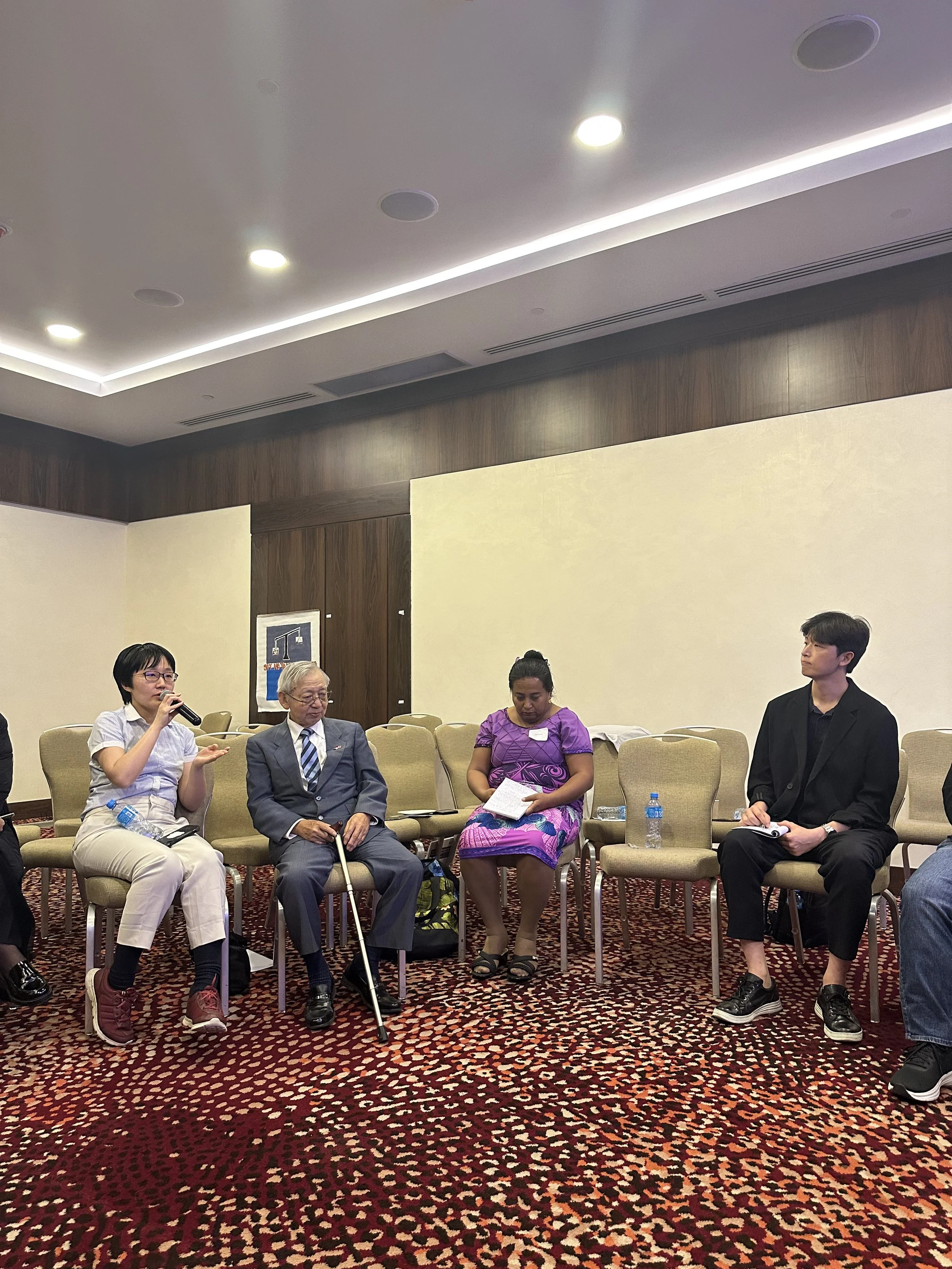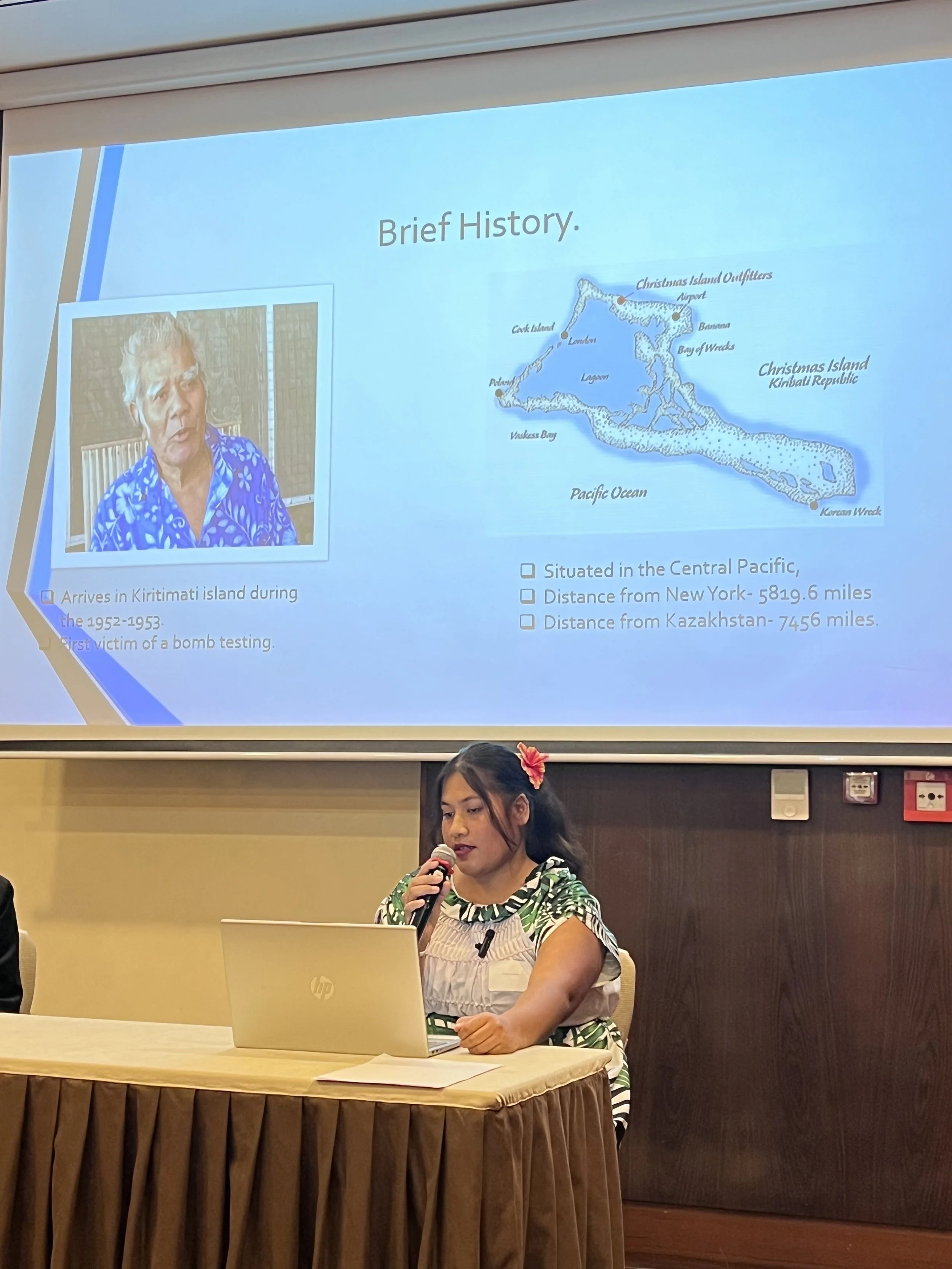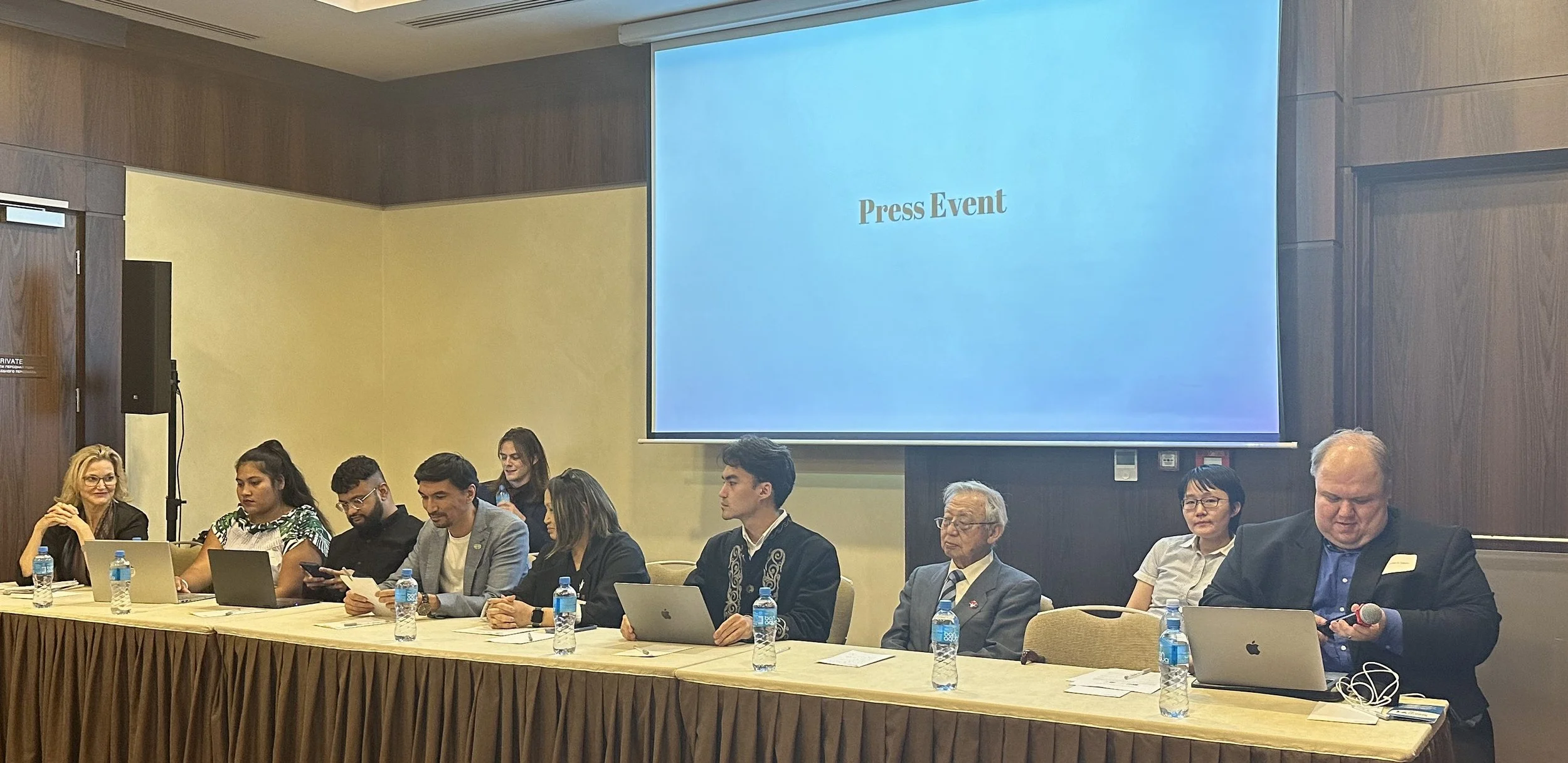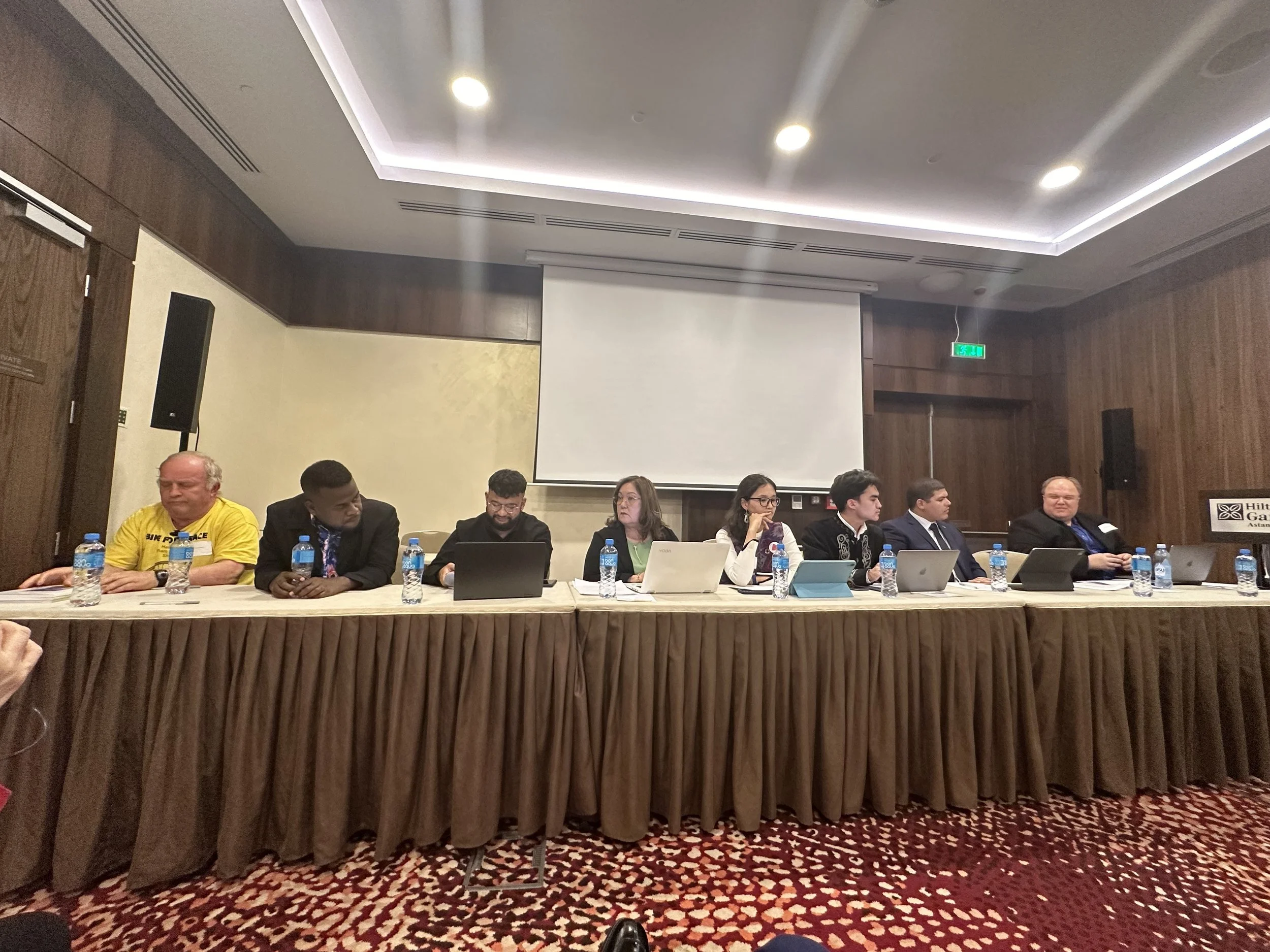
From the Pacific to the Steppes: Addressing the Nuclear Sins of the Past and Advancing Justice
August 29th, 2024
Astana, Kazakhstan
Our Financial Sponsors:
The Telemachus Foundation to Empower the Poor and End War, The Prospect Hill Foundation, Walden Foundation, Joanne Dufour, and James Manista
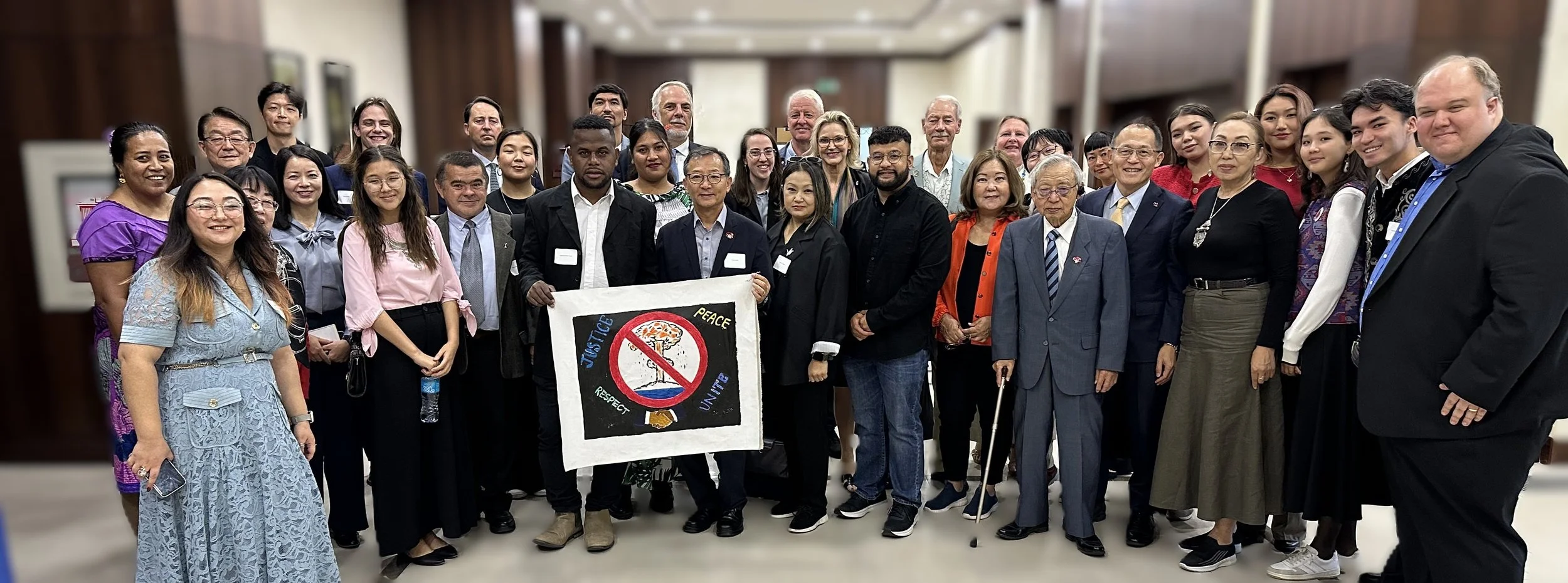

Youth Forum Kazakhstan 2024
The Youth Forum on Nuclear Justice convened a diverse array of global stakeholders to address the enduring effects of nuclear weapons testing and use. This platform emphasized the importance of international collaboration, empowering frontline communities, and promoting youth-led initiatives.
The event unfolded in three primary segments. The High-Level Segment in the morning gathered leaders in nuclear disarmament, including notable figures, such as Dr. Ivana Hughes, Christian N. Ciobanu, and H.E. Ambassador Alexander Kmentt. These experts engaged in discussions about existing pathways to justice, reflecting on historical and contemporary efforts aimed at rectifying the legacies of nuclear weapons within the framework of the Treaty on the Prohibition of Nuclear Weapons (TPNW).
Following this segment, the Youth Forum provided a platform for personal testimonies from individuals belonging to affected and frontline communities. This led to a crucial dialogue on the support needed for the proposed TPNW International Trust Fund. Advocacy efforts were showcased, including movements like the Nevada-Semey Initiative and artistic contributions from Kiribati and the Solomon Islands.
The day culminated with an Evening Press Event and Joint Panel featuring members from the Nuclear Survivors Forum and the TPNW Coordination Committee, fostering an intergenerational connection between youth, survivors, and policymakers. Key outcomes of the forum included the formal adoption of a compelling Youth Declaration aimed at the members of the Coordination Committee and the establishment of a sustained Youth Network dedicated to advancing nuclear justice.

Youth Declaration
The Youth Declaration emphasizes the need for a collective approach to ensure justice and disarmament regarding nuclear weapons, highlighting the responsibilities that current generations hold towards future ones. Central to its objectives is the proposal for an International Trust Fund that would financially assist victims and support environmental remediation efforts in affected areas.
Inclusivity is a significant theme within the recommendations. It underscores the necessity for the involvement of affected communities—particularly youth, Indigenous peoples, and women—in the decision-making processes that influence their lives. This inclusive approach aims to foster transparency and accountability, ensuring that resources are allocated equitably. Additionally, the declaration advocates for capacity building within communities to facilitate access to necessary services and the provision of translation services to enhance engagement and understanding among diverse groups.
By prioritizing these elements, the Youth Declaration seeks to lay a foundation for meaningful progress in addressing the legacies of nuclear weapons and promoting sustainable futures for all affected communities.
Adiya Akhmer (left), Member of STOP and Yerdaulet Rakhmatulla (right), Co-Founder of STOP, deliver the Youth Statement at the Joint Panel.
Adiya Akhmer and Yerdaulet Rakhmatulla deliver the Youth Statement at the Joint Panel.
Contributors: Aigerim Seitenova, Steppe Organization for Peace, Republic of Kazakhstan; Adiya Akhmer, Steppe Organization for Peace, Republic of Kazakhstan; Benetick Kabua Maddison, Marshallese Educational Initiative, Republic of Marshall Islands; Brock Walker, Nuclear Age Peace Foundation / Reverse The Trend, United States of America; Christian Ciobanu, Nuclear Age Peace Foundation / Reverse The Trend, United States of America; Ereti Tekabaia, Advisor, Reverse The Trend, Kiritimati Island, Republic of Kiribati; Maverick-Peter Seda, Coordinator, Reverse The Trend Pacific Chapter, Solomon Islands; Tinabora Ioane, i-Kiribati Youth Activist, Kiritimati Island, Republic of Kiribati; Yerdaulet Rakhmatulla, Steppe Organization for Peace, Republic of Kazakhstan.
Adiya Akhmer, Yerdaulet Rakhmatulla, Benetick Kabua Maddison, and Dr. Kaisha Atakhanova present the Youth Statement and Nuclear Survivors Forum outcome document to H.E. Ambassador Teburo Tito and Director Arman Baissuanov.

High-Level Segment: Engaging Leaders and Experts
Key leaders and diplomats in nuclear disarmament spoke during this segment on the importance of addressing the legacy of nuclear weapons through the TPNW’s International Trust Fund.
The participants included: Christian Ciobanu, NAPF Policy and Advocacy Director, RTT Project Coordinator, TPNW Advisor; Director Arman Baissuanov of the Kazakh Foreign Ministry; President Dr. Ivana Hughes of NAPF; Aigerim Seitenova, Co-Founder of STOP; Chris King, Chief of the Weapons of Mass Destruction Branch, UN ODA; Melissa Parke, Executive Director of ICAN; Veronique Christory, Senior Arms Adviser to the ICRC; Ambassador Alexander Kmentt of Austria; and Counsellor Alonso Martinez Ruiz of Mexico.
One central theme during this discussion was the important role of frontline and affected communities in advancing the framework for an inclusive, effective, and just International Trust Fund.
Ambassador Alexander Kmentt of Austria and Counsellor Alonso Martinez Ruiz of Mexico engage in dialogue about the successes of their States’ respective presidencies of the First and Second Meeting of States Parties respectively.
Cristian Ciobanu (right) begins the Youth Forum with welcoming remarks next to first panel of participants (in order from right to left): Melissa Parke, Aigerim Seitenova, Arman Baissuanov, and Chris King.
Audience included members of the TPNW Coordination Committee, members of the ICAN-Peace Boat Nuclear Survivors Forum, and youth from Kiribati, the Solomon Islands, and Kazakhstan.
Click on any icon below to hear these experts’ speeches
Veronique Christory (left) highlights the historical role of the ICRC in addressing the humanitarian consequences of the use of nuclear weapons.
Dr. Ivana Hughes addresses the audience in a recorded statement underscoring the consequences of nuclear war.

Voices from the Pacific
Tinabora Ioane, i-Kiribati Youth
Tinabora Ioane is a 24-year-old from Tabkea Village on Kiritimati Island. Growing up in a village that was designated for coconut planters and cutters during British colonization, she has a rich familial and cultural history that is deeply intertwined with the island's past. Kiritimati Island has been significantly affected by the British and American nuclear testing programs, which have left lasting impacts on its environment and its people.
Maverick Peter Seda, RTT Pacific
Maverick Peter Seda, an indigenous Pacific Islander from the Solomon Islands, debuted in Kazakhstan with disarmament art from his community, aimed at engaging Kazakh youth and promoting discussions on art’s role in peace advocacy. During his visit, Seda joined a Joint Panel with the Coordination Committee, emphasizing the importance of youth participation in international decisions regarding the International Trust Fund.
“My message to the international community, and especially for the Pacific States, is to support the TPNW and ratify the TPNW.”
- Maverick Peter Seda
“It has been four generations now and nothing has been done for the affected communities in Kiribati.”
- Ereti Tekabaia
“My message to young people is to not be afraid to raise your voices and concerns to the whole world so that justice can be achieved.”
- Tinabora Ioane
This journey marked a pivotal moment for Pacific nuclear activists, highlighting the importance of cross-cultural solidarity and shared experiences in addressing the legacy of nuclear testing. Engaging directly with Kazakh affected individuals allowed activists to gain firsthand insight into the long-lasting repercussions of these tests on communities, health, and the environment.
The testimonies illuminated not only the personal trauma endured but also the broader socio-economic consequences faced by these communities. Many described the profound loss of land, health issues, and the struggle for recognition and justice. The emotional weight of these stories underscored the necessity of amplifying local voices in discussions about nuclear policy and activism.
Through this initiative, a foundation for ongoing dialogue and collaboration was established, aiming to enhance awareness and drive advocacy efforts against nuclear testing worldwide. This experience reinforced the notion that the fight against nuclear injustice transcends geographical boundaries, bringing together diverse communities affected by similar legacies of harm.
Maverick Peter Seda (left), Christian Ciobau (center left), Brock Walker (center right), and Tinabora Ioane (right) pose for a photo.
Ereti Tekabaia was born and raised in Kiritimati Island. This was her first time in Kazakhstan. She is passionate about community projects, especially for youth. Tekabaia displayed art during the Youth Forum that she collected from her local community’s youth to support disarmament causes and bring attention to the nuclear legacy. Tekabaia is passionate about uncovering the forgotten history of British and American nuclear testing in Kiribati.
Interviews with Our Pacific Participants
Ereti Tekabaia, RTT Advisor

The Heart of the Event: Youth Panels
Yerdaulet Rakhmatulla (middle) translates for Karipbek Kuyukov (right) as he answers a question posed by Brock Walker (left).
The first panel of the Youth Forum centered on the historical legacy of the Nevada-Semey movement, aiming to inspire youth in their advocacy for nuclear justice. Brock Walker, Nuclear Justice Campaign Manager at NAPF/RTT, initiated a dialogue with Karipbek Kuyukov, exploring his leadership role in the movement and his collaborations with American activists.
The subsequent panel featured personal testimonies from youth belonging to frontline and affected communities, sharing their aspirations for a Treaty on the Prohibition of Nuclear Weapons (TPNW) International Trust Fund. Moderated by Yerdaulet Rakhmatulla, Co-Founder of the Steppe Organization for Peace (STOP), the discussion included perspectives from Benetick Kabua Maddison, Executive Director of the Marshallese Educational Initiative, Adiya Akhmer of STOP, and youth activist Tinabora Ioane from Kiribati. Insights regarding the impact of nuclear weapons in Kiribati, Kazakhstan, and the Marshall Islands shaped the recommendations for the Youth Declaration.
Yerdaulet Rakhmatulla (left) introduces Benetick Kabua Maddison (right) as he shares his family’s personal history with the American nuclear testing program.
Sueichi Kido (center left) shares his solidarity with third-generation Korean Hibakusha Keunwoo Lee (right).
The Forum concluded with Maverick Peter Seda and Ereti Tekabaia presenting the outcomes of their community collaborations aimed at creating meaningful disarmament art. They emphasized the importance of utilizing artistic expression within the anti-nuclear movement, highlighting its ability to bridge national boundaries.
Interview with Christian N. Ciobanu about Kazakhstan Youth Forum
Adiya Akhmer (right) shares her vision for civil society’s involvement in the management of the trust fund.
Following the panels, participants engaged in an intimate discussion session to express their individual aspirations for nuclear justice and reflect on notable moments from earlier discussions. A significant intergenerational exchange took place when Mr. Sueichi Kido, a Hibakusha who survived the atomic bombing of Nagasaki, shared his experiences. He expressed his happiness in witnessing the ongoing fight for justice carried on by the assembled youth activists.
Benetick Kabua Maddison (left), Tinabora Ioane (middle), and Maverick Peter Seda (right) present art from the Solomon Islands.
RTT’s Nuclear Justice Campaign Manager Brock Walker was instrumental in coordinating and facilitating the panels throughout the day.
Tinabora Ioane shares the history of British and American nuclear testing in Kiribati.
Participants of the Youth Forum pose for a photo.
Maverick Peter Seda (left), Ereti Tekabaia (center left), Tinabora Ioane (center right), and Christian Ciobanu (right) pose for a photo at the Palace of Peace and Reconciliation.
Interviews with Youth Participants
Interview with Brock Walker about the Youth Forum
Interview with Yerdaulet Rakhmatulla about the the UN Office for Disarmament Affairs’ N.O.N.E. Campaign
Interview with Keunwoo Lee, a third-generation Korean Hibakusha, about his participation in the youth forum.

Press Event and Joint Panel with Coordination Committee
Christian Ciobanu (right) moderates the Press Event by posing questions to the panelists.
The day concluded with two events. The first was a Press Event with speakers from the ICAN - Peace Boat Nuclear Survivors Forum and the Youth Form. The Astana Times reported on the Youth Forum in an article found here.
The second event was the Joint Panel Discussion with members of the TPNW, Coordination Committee, the ICAN - Peace Boat Nuclear Survivors Forum and the Youth Forum.
From left to right: Melissa Parke, Tinabora Ioane, Benetick Peter Seda, Alimzhan, Aigerim, Yerdaulet, Sueichi Kido, and Christian Ciobanu gather at the panel to answer questions.
From Left to Right: Tore Nærland, Founder and President, Bike for Peace; Maverick Peter-Seda, Coordinator, Reverse The Trend (RTT) Pacific, Benetick Kabua Maddison, Executive Director, Marshallese Educational Initiative (MEI), Dr. Kaisha Atakhanova, Kazakh Biologist; Social Activist, Adiya Akhmer, Member, Steppe Organization for Peace (STOP), Yerdaulet Rakhmatullah, Co-Founder, Steppe Organization for Peace (STOP), Matías Andrés Eustathiou de los Santos, Second Secretary, Mission of Uruguay, Christian Ciobanu, Policy and Advocacy Director, Nuclear Age Peace Foundation (NAPF); Project Coordinator, Reverse The Trend (RTT); TPNW Advisor, Mission of Kiribati
At the joint panel, Matias Andres Eustathiou de los Santos, Second Secretary of the Mission of Uruguay and Co-Chair of the Universalization Working Group of the TPNW provided a summary about the meeting of the TPNW coordination committee. He focused on the discussions regarding the International Trust Fund (Articles 6 and 7), and dismantlement of nuclear weapons (Article 4)
Yerdaulet Rakhmatulla (center) responds to a question regarding the International Trust Fund.
Melissa Parke (left) answers question regarding the humanitarian implications of nuclear war.
At the joint panel, Dr. Kaisha Atakhanova, a Kazakh biologist and Social activist, provides recommendations about the International Trust Fund


